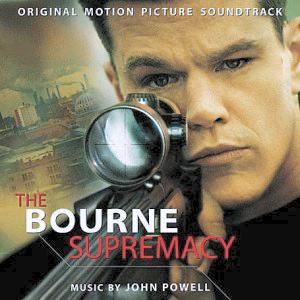The Bourne Supremacy
Music composed by John Powell
Available on Varese Sarabande / VSD-6592
Running time: 46.23
Amazon UK Amazon US

See also:
- The Bourne Identity (John Powell)
- Paycheck (John Powell)
While this second film in the Bourne franchise changes director to Paul Greengrass somebody made the right decision to keep the original composer, John Powell. His contribution to The Bourne Identity was a genuine action score and had no memorable theme music. Here the parameters are altered. Powell's style makes the transition smoothly from the one project to this sequel, keeping the same frantic and energetic mood as before. The difference is the composer still utilises the electronics when the movie calls for action but remains mostly with orchestral writing for the dramatic pieces, emphasising Jason Bourne's inner struggle with a past he can remember only in part. That more orchestral and sensitive approach is what makes the difference, along with the presence of strong and memorable themes that altogether elevate this score to a higher level.
The album opens with 'Goa'. An attention grabbing piece that begins with a sensitive and delicate melody accompanied by light and warm strings, then changes to drums and percussion with a groovy Spanish-flavoured guitar adding a mantle for the main theme to be performed by the full orchestra. Powell here uses the major – minor chord transition in order to create an effective atmosphere. Some electronics are added later and give this piece a more dramatic general mood.
'The Drop' starts with light percussion imitating the sound of a ticking clock, presenting a 12-note motif, here performed by cello, which will be used throughout the score, sometimes with a slight variation of 14 or 16-notes. Dramatic string lines enter just before the end and offer an eastern feeling, leading to the heavy drums that conclude the cue.
'Funeral Pyre' is one of the highlights of the album, mainly due to the beautiful string lines that accompany the piano gently performing a slower, calm rendition of the main theme. Rhythmic percussion concludes this wonderful piece.
In 'Nach Deutschland', using xylophone and piano, Powell pays a little tribute to the American Beauty style of Thomas Newman. An 8-note string arpeggio motif makes its first appearance along with light drumming. Some dramatic writing for strings serves as a slight intermission and leads to a tense and rhythmic mood laced with electronics. 'Moscow Wind Up' is comparable, although the 8-note string arpeggios are more interesting. This later piece offers more suspense with dense writing for strings, electronics and electric guitar. The result is somewhat overly noisy and messy at times.
'To The Roof' is pure 'spy' music and a highlight of the album, giving away the film's intent as a modern, more serious James Bond. 'New Memories' is certainly the best of the whole score. Powell again uses a sad bassoon motif heard in 'Goa' together with exemplary strings. Those very strings take the lead of the melody later on, only to return it to the bassoon so there is a fixed play between those instruments, a constant dialogue, question and answer. A dramatic, tragic, heart-breaking piece that stays at a level above all that's been heard before.
'Berlin foot chase' is a compelling and thrilling action piece that uses the 16-note cello theme along with a strings variation of 14-notes, mixed percussion, odd electronics and electric guitars that successfully build tension while sometimes, on the contrary, becoming too noisy to follow.
'Bim Bam Smash' is another highlight. A pure electronic piece firmly based on trance and with a slight dose of drums 'n' bass. The 16-note string motif makes its appearance again and leads the later half of the piece with a spectacular and adrenaline-pumping ending.
The album concludes with 'Extreme ways' by Moby, the now-trademarked song that goes in hand with the score by John Powell. It's definitely not out of place and its absence from the original Bourne Identity score album was unjustified. This song has more or less officially become a signature song for the Bourne films.
Overall The Bourne Supremacy is a welcome change and transition of style for John Powell, from his previous installment into a more orchestral style of writing, while retaining the trademarked electronics. Fans of the composer should really enjoy this score as well as the listeners who like their action and suspense music interweaved and successfully blended with dense electronics, such as Harry Gregson William's Spy Game and Man on Fire. Powell here provides a solid, well-crafted, involving and interesting score with strong and memorable themes that should leave no one bored or frustrated, but rather shaken and stirred.
Demetris Christodoulides
3½
Return to Index